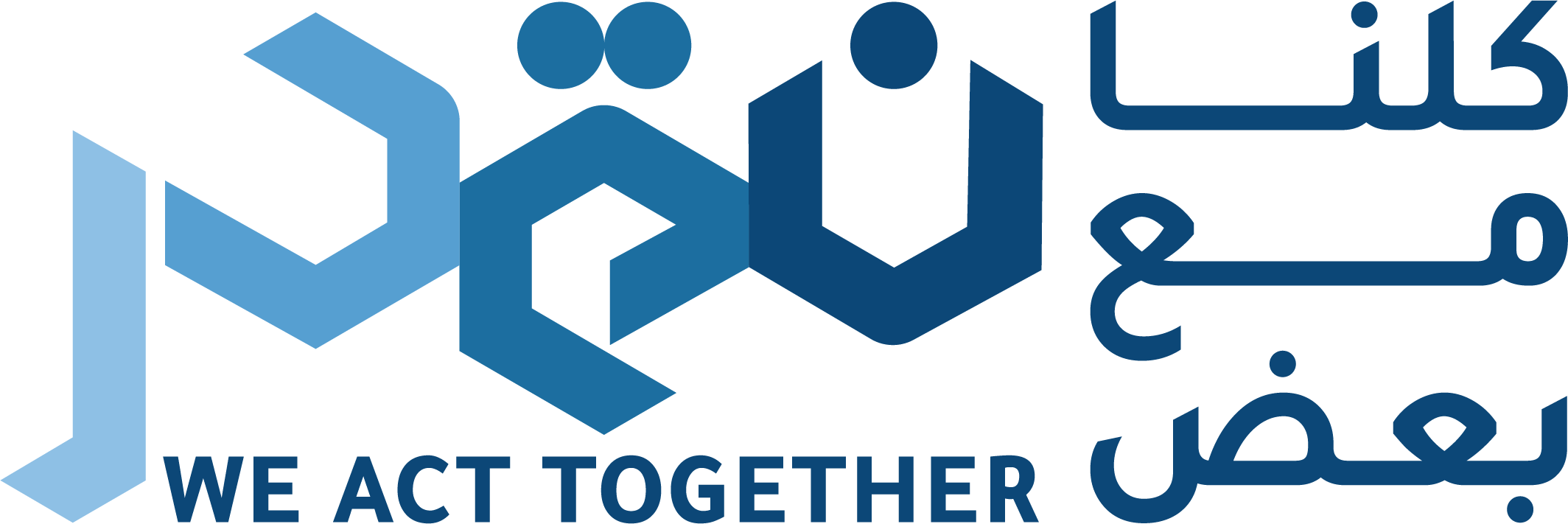Ali Abdul Imam – Bahrain
Ali Abdul Imam
Bahrain
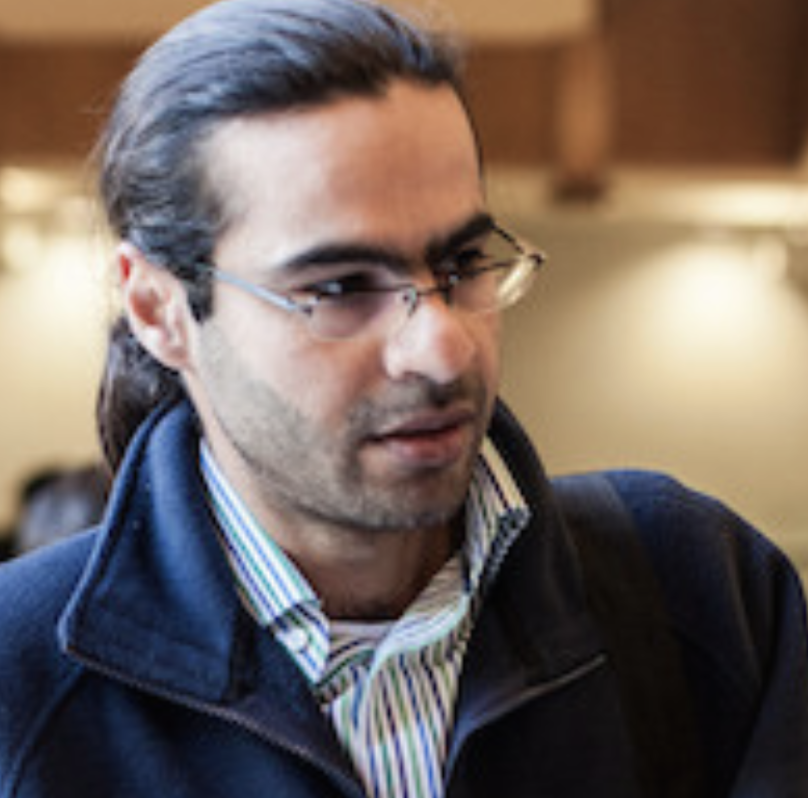
Ali Abdul Imam, a human rights defender and blogger, could not have foreseen, back at a time when no one knew what a “virtual forum” was, that the “Multaqa Al-Bahrain” [Bahrain Forum] (Bahrain Online), which he founded in 2001, was going to become such a prominent actor, not only in cyberspace, but also on the political arena, and that it will be what triggered the February 14, 2011 revolution.
He had an ordinary upbringing, but his generation witnessed dramatic political, social and technical changes in the country. That generation was impacted by the Iran-Iraq war, the first Iraq war and the liberation of Kuwait, which led to political and geopolitical changes in the region. He belonged to a generation that witnessed the early days of the Internet and the change it brought about in society. Ali lived in Bahrain, where internal conflicts have been present for a long time, between a ruling family that wants to control wealth in the country, and opposing political groups which represent various political directions, such as liberalism and Arab nationalism. Ali grew up while two cousins of his were in detention. These circumstances caused him to realize that there was a problem, even though he did not have enough awareness to process its dimensions.
“Bahrain Forum” (Bahrain Online)… From a notion to a revolution
In 1998, Ali’s life was drastically transformed as a result of his online activism. He founded the “Bahrain Forum” (Bahrain Online), which was the first ever online forum that became operational in 1999. After the first five members signed up to join the forum, Ali got worried, because the law allows the authorities to detain persons for terms of up to three years, which can be extended without investigation or charges, solely on the grounds that the persons concerned are believed to pose a threat to national security. Ali knew that these laws give way to the authorities to do anything, including turning a tweet into a criminal offence.
The forum made a qualitative difference in virtual political activism and opened the door for people to discuss human rights issues and political affairs. It later became the most active and vibrant political forum, despite having been blocked by the authorities more than nine years ago. The forum had turned into a broad space, from which numerous discourses, statements, activities, and events emerged.
| The Forum posted one and a half million articles. The website traffic was around 150,000 daily visits, and would double on days of major events such as demonstrations or casualties among protestors. Such traffic was substantial, considering that Bahrain’s population at the time did not exceed 700,000 persons. Visits to the Forum were mainly from Bahrain, Saudi Arabia, UAE, Kuwait, Iraq, the UK and the USA, as well as from countries all over the world. |
Universal Rights, Dialogue, and a Culture of Diversity
The Forum was an inclusive community which welcomed many defenders, journalists, politicians, writers, activists, intellectuals and citizens. The Forum worked to disseminate awareness about human and political rights in the country. The Forum sought to enlighten people as to their fundamental rights guaranteed by the International Covenant on Civil and Political Rights, and informed them on the importance of working to establish a civil state that respects the principles of good governance. The Forum brought together different positions across the political spectrum and provided a space for free dialogue and interaction, which essentially reinforced the culture of diversity. The Forum succeeded in enhancing cultural and human rights awareness at a time when no other platform or media outlet did. One testimony to the Forum’s widespread impact came when a minister was asked during a meeting “Don’t you read the papers?”, and his response was “No, I read the Bahrain Online Forum”, which is indicative of the extent of credibility the Forum had gained.
Abdul Imam was arrested for the first time in March 2005, on charges of “inciting hatred against the government”. Despite having been subjected to brutal torture, he carried a banner which read “This is how freedom of expression is violated in Bahrain”, the day after he was released, at Bahrain’s first sit-in, in front of the Ministry of Information Affairs.
| I experienced first-hand the brutality of the authorities in the cells of the security apparatus.. I suffered and felt very thirsty. |
Bahrain Forum in WikiLeaks
On March 1, 2005, a WikiLeaks document revealed that the Bahrain Forum was a constant concern of the US Embassy, and the subject of several telegrams attempting to understand the prevalent trends in Bahrain and the Gulf, through the actions taken by the authorities against the detained website administrators. A telegram indicated that the US ambassador discussed this matter with high-profile officials at the time.
The Forum Gave Rise to Events at the Pearl Roundabout
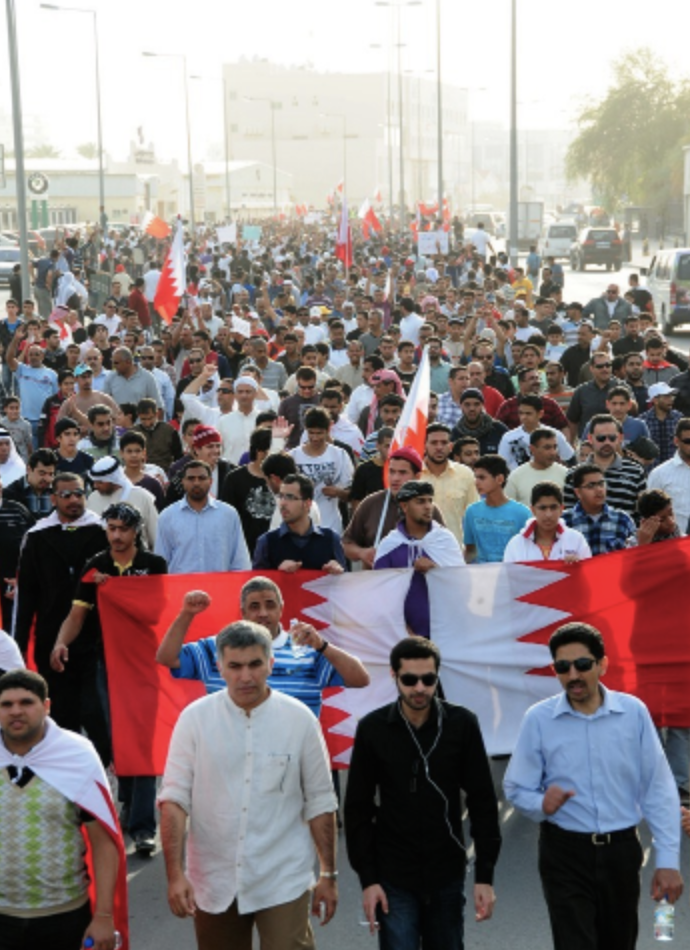
| At the Pearl Roundabout, I could sense dignity instead of hatred. |
Bahraini authorities arrested Ali again after he was charged with spreading false information in 2010. He was dismissed from his job at Gulf Air, the national carrier of Bahrain, where he was employed as an IT specialist. However, the revolution that was ignited by the blog made his exit to the space of freedom and the Pearl Roundabout more pressing.
The revolution was triggered by Ali Abdul Imam’s blog, which persevered despite 10 years of struggle and blocking. It succeeded in planning to ignite the spark of the February 14, 2011 revolution. Bahrain Online became the only space where the importance or the necessity of a revolution was being discussed, and where all the revolution programmes and strategies were engineered, including agreeing on the time and place, mottos, founding statements and organization methods.
| “The February 14 revolution was the moment that changed my life and made me believe more in my humanity. It caused me to respect my humanity, even if my opponent was a monster who took pleasure in seeing you get tortured and killed”. |
Ali believed that the revolution was the moment of making a choice between being a free and dignified citizen, or the opposite of that. He believed that one must stand up for another person merely on the grounds of being a fellow human, or else one turns into that other person which he despises.
Three weeks after his release on February 23rd, Ali spent close to two years in hiding in Bahrain, after being sentenced in absentia to 15 years in prison before a military court in June 2011, on charges of plotting a coup against the Bahraini government. During his forced isolation, he was haunted by memories of brutal torture and the sight of people who got killed on the streets, and also concerns for his family who was subjected to immense pressure. Many people developed PTSD, and many others had their lives ruined and lost their livelihoods due to state brutality.
| I learned of my friends’ funerals every day. My parents were terrified, and I was afraid that my children would get hurt on the street. I felt that I was powerless and helpless. |
Many of the victims who died were his friends or close acquaintances. In 2011, the state committed barbaric acts of murder, repression and torture, which no one can imagine or tolerate, all the more so considering that Bahraini people are peaceful people who have not lived through civil war.
Many blogs and web pages were created to demand the disclosure of his fate, and many NGOs and defenders wrote about his case. This had a major impact on him because it made him better appreciate the value of the work he did.
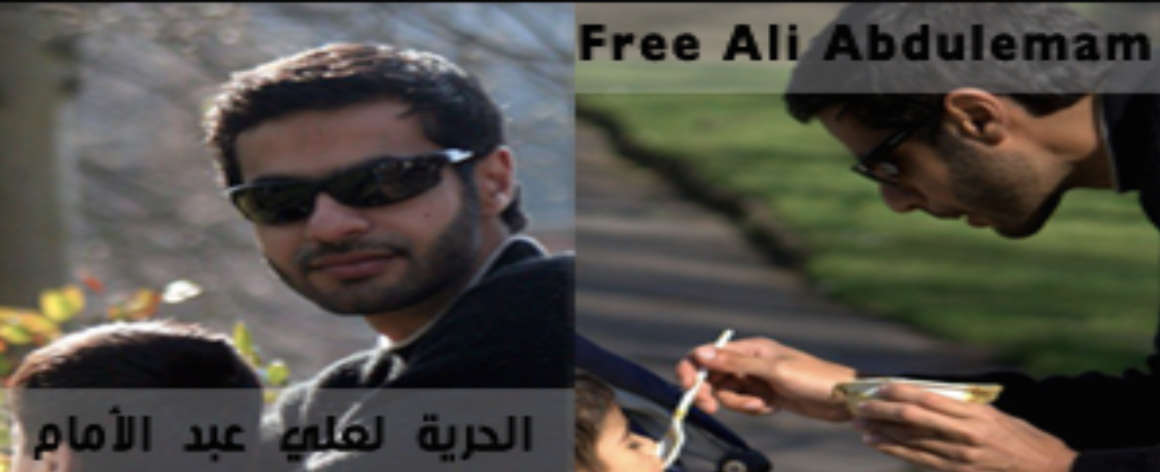
| “I felt that the work I did was not wrong, and understood that there were people who believed in me, despite the government’s attacks. People at these NGOs believed that I was innocent and that the accusations against me were fabricated by the government”. |
100 Books during his Forced Isolation and Disappearance
He lived for two years completely isolated from the world, during which everything was available to him except for his liberty. That was one of the toughest times. During his forced isolation and disappearance, he spent his time reading. He would finish reading a book within two days.
| I challenged myself to read 100 books within a year, and I did through www.goodreads.com. |
He particularly recalls The Diary of Anne Frank, which contained the memoirs of a young girl who was in hiding for two years. He watched many movies, learned to use new software, and tried not to lose touch with technology. He tried as much as he could to keep abreast of the daily news of the revolution. His immediate family suffered more than any other involved party. His wife found herself fully in charge of a house with three children, a son and twins below one year of age. The children could only see their father through some photos on the phone.
After Two Years in the Dark… “I’m in London”.. Embracing the Sun in Britain
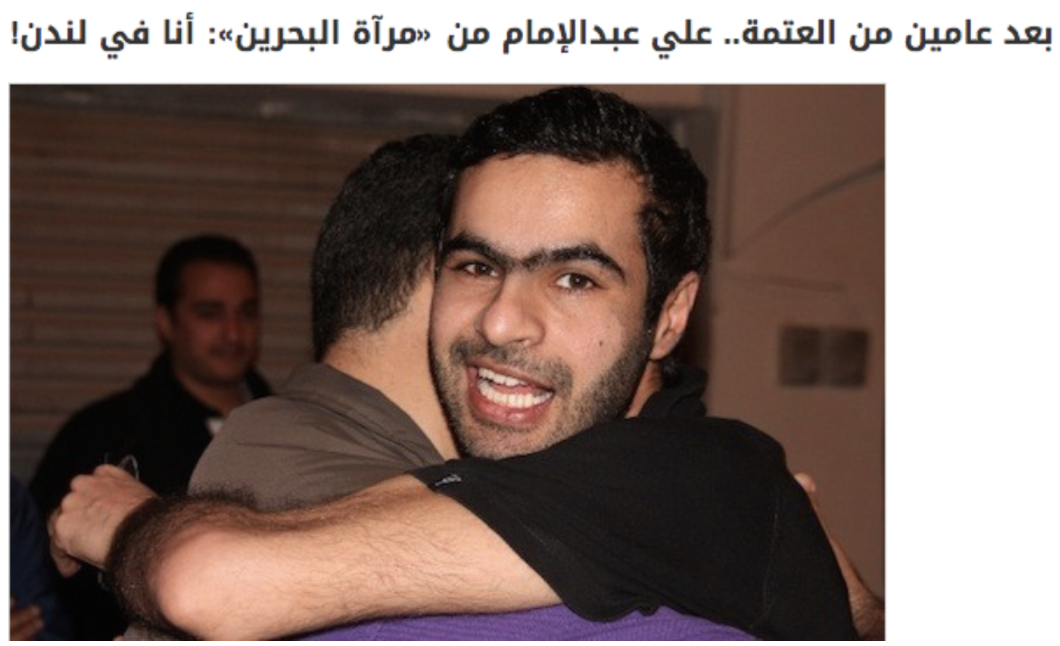
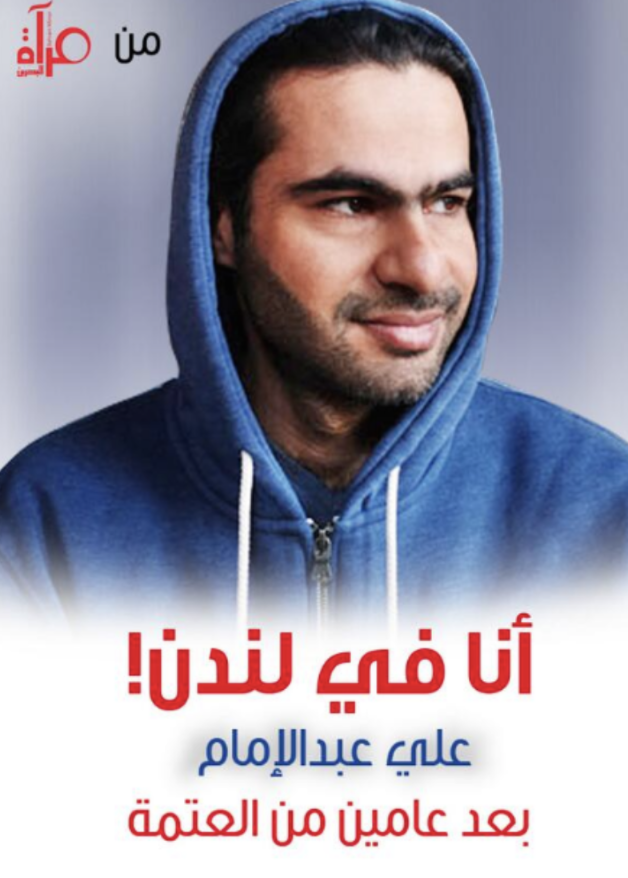
In May 2013, Ali managed to flee the Kingdom of Bahrain and was granted political asylum in Britain. His Bahraini nationality was revoked, and his son, who was born in Britain, was stateless.
On May 21, 2013, the Danish Centre for Political Studies (CEPOS) held its annual awards ceremony, and Abdul Imam received the Freedom Prize and a monetary award amounting to USD 60,000.
He lives a free man now, and his battle against the regime continues, as he works to help Bahrainis attain their universal rights. He provides them with technical support, training and all the tools that protect them from surveillance, which has massive financial implications on the state, and helps overcome the methods employed by the state to restrict access to information in Bahrain, and examines all possible spyware that can be used against activists and human rights defenders. Should any Instagram, Twitter or Facebook account be hacked, Ali directly communicates with the respective companies in order to have the account restored.
I Chose to be a Human
My experience with the state has put me before two choices: either to turn into a monster as a product of the state’s brutality, or be a human being in spite of everything. I chose to be human.
